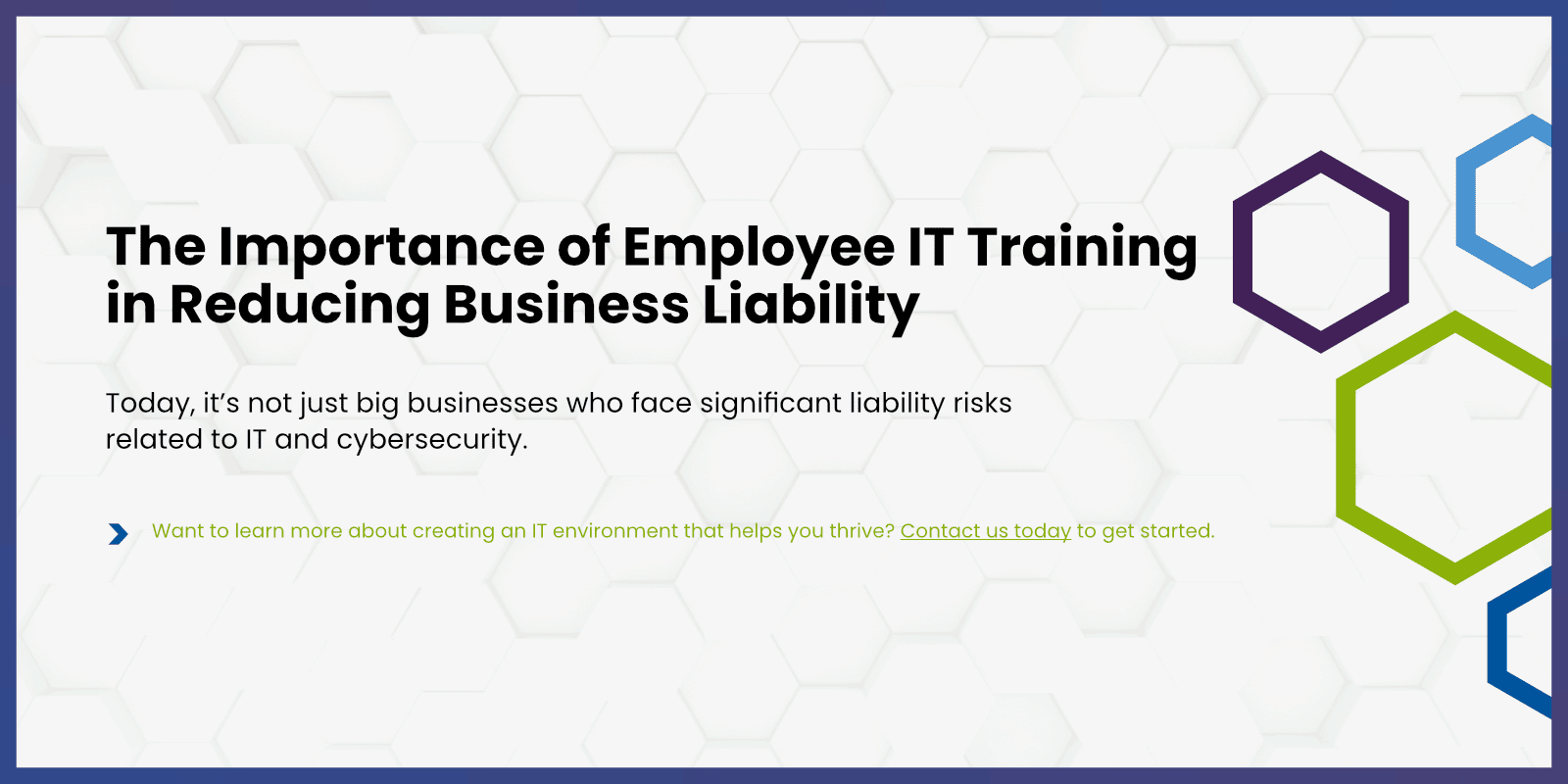
By Principal Farica Chang
Today, it’s not just big businesses who face significant liability risks related to IT and cybersecurity. Legal fees, non-compliance penalties, and increased cyber insurance coverage are just some of the financial repercussions that can follow IT incidents, especially cybersecurity breaches. These costs can be crippling for large corporations (Meta was fined $1.3 billion for violating the GDPR last year), let alone SMBs operating on more modest budgets.
Although cybersecurity breaches can lead to severe financial losses, the impact on a company’s reputation can be even more damaging.
A well-trained team is crucial in reducing business liability by preventing incidents that could lead to detrimental consequences. Your team’s actions directly affect cybersecurity, and as a business owner, it’s up to you to take proactive steps to educate your workforce on best practices and empower them to work responsibly. In this blog, we’ll explore just what that might look like.
Reducing Cybersecurity Slipups to Safeguard Your Reputation
A business’s reputation is as valuable as it is fragile. In the event of a cybersecurity incident, it’s not your response that makes the biggest difference, but the preemptive steps you’ve taken beforehand. If customers see that you’ve done everything possible to prevent a breach, they’re more likely to be understanding and forgiving.
Conversely, if it becomes evident that you’ve neglected employee IT training and basic cybersecurity measures, trust and respect will plummet. Customers expect businesses to prioritize their data security, and failure to do so can result in long-term damage to your standing and, ultimately, your bottom line.
Beyond respect and reputation, regulatory agencies and cybersecurity insurance providers tend to treat businesses who are breached more kindly when every protective measure has been taken, rules have been followed, and compliance goes well beyond what’s referred to as “paper compliance” or just checking boxes without follow-through.
So how do you ensure cybersecurity stays front-of-mind for your team?
Integrating Cybersecurity into Daily Practices
Digital safety should be an integral part of daily business operations, not an afterthought. When employees view security as a fundamental aspect of their roles, they’re more likely to follow best practices consistently. Clear, simple processes embedded into everyday tasks can help make cybersecurity second nature to your team, rather than an extra burden to add to their to-do list (and then neglect).
This approach reduces the often-perceived burden of cyber safety measures and encourages adherence to protocols. Ensuring that your team understands and routinely practices these measures can significantly reduce business liability by preventing avoidable security incidents.
Building a Robust Shield: Focus on Your Foundations
Creating an effective employee IT training program involves two core tenets:
- Work from the Bottom-Up: Start with the basics. Every employee should understand fundamental cybersecurity concepts, such as identifying threats and protecting data privacy. This foundational knowledge is crucial for building more advanced skills.
- Simplicity: Don’t overwhelm employees with complex information early on. Focus on straightforward strategies that can address common threats, making cybersecurity approachable for all team members.
Establishing a fully fortified defense around your business means even your least technologically-inclined team member needs to become a protector rather than a potential problem. Effective training should demystify cybersecurity, breaking it down into easy-to-understand elements. This approach reduces the intimidation factor and ensures that all employees can grasp and apply the essential security practices.
Making Training Stick: Strategies for Effective Cyber Education
- Make It Mandatory
Cyber threats are constantly evolving, which means cybersecurity training must be continuous. Regular, mandatory training ensures that all employees stay updated on the latest threats and best practices. Integrating ongoing training into your business calendar and making participation compulsory helps maintain high levels of security awareness—so long as the sessions are engaging.
- Make It Engaging
Practical exercises, like simulated phishing attacks, reinforce training lessons and provide hands-on experience in a controlled environment. These activities test your team’s ability to recognize and respond to real-world threats and are incredibly useful not just for boosting their confidence but also for highlighting any areas where further training might be needed.
- Gamify Training: Interactive training sessions improve retention. No one enjoys a 90-minute lecture, so ensure your training program incorporates gamified elements to make learning more fun.
- Realistic Simulations: Emails aren’t the only place your team is vulnerable. Simulate attacks via multiple channels, including social media.
- Personalization: Employ the same social engineering tactics that cybercriminals will use to create personalized phishing messages. This keeps the training and simulations more relevant and impactful.
- Make It Matter
Real-life examples of cyberattacks provide concrete context for the risks businesses face. Discussing recent, applicable examples of security breaches during training sessions illustrates the direct consequences of lapses in cybersecurity and the benefits of effective preventive measures.
Collaborate with experts to gather and present these examples. When employees see how similar businesses have been impacted, the lessons resonate more deeply, enhancing their understanding and commitment to cybersecurity practices.
Security as a Shared Responsibility
Focusing on company-wide cyber awareness takes time and dedication, but it’s an essential shift for modern businesses of any size. Every single employee has a role to play; no one is too insignificant to be a target, and often, it’s the people least concerned who are the most at risk.
Think about it—if you were a cybercriminal, who would you target: a clued-up IT department, or the new hire who has no idea about the company’s security protocols, and likely won’t until the next annual training in six months?
Educating your team about cybersecurity is like equipping them with oven mitts to handle hot potatoes (aka digital threats). When every employee is trained and aware of security protocols, they’re better prepared to face dangers head-on, enabling them to squash the problem themselves before everyone gets burnt.
Anderson Technologies: Real People Creating Business-Changing IT Solutions
For over 25 years, Anderson Technologies has leveraged our expertise for the benefit of our clients, supplying them with suitable, secure IT, and strategic guidance for their technological future.
We’re a dynamic team of IT professionals with over 200 years of combined experience, and specialist certifications to back up our knowledge. As a trusted advisor, we don’t just focus on today. We strive to take your technology light-years ahead of your competition and scale with your business’s success.
Ready to secure your business? Contact us today to get started.



